The project coordinator role is a professional who helps ensure that a project is completed on time, typically works with a project manager, and is responsible for scheduling, budgeting, and resource allocation. In some cases, a coordinator may also be responsible for quality control and risk management tasks.
Project Coordinator Statistics
- 25 million new project management professionals will be needed to support teams by 2030. 71% of project coordinators were 40+ years reinforcing the need for new project coordinator professionals.
- 61% of companies committed to providing employees with project management training. Any project management training gives you the fundamental skills to become a project coordinator.
- Fortune 500 companies account for 25% of project coordinator roles on the market, followed by technology at 13% and finance at 8%.
- The average project-management-oriented salary is around $111,399. Software development, particularly Agile, has several crossover roles, such as Scrum Master project coordinators.
- 62% of project coordinators are female, according to a recent study, increasing 6% in the last 10 year
Sources: Talent Gap 2021 Report | PMI, Project Coordinator Demographics and Statistics [2022]
- Project Coordinator Statistics
- Project Coordinator Role
- Essential Skills of Project Coordinator
- Agile Project Coordinators
- Career Path for Project Coordinators
- Project Coordinator vs Project Manager Salaries
- Project Coordinator vs Project expeditor
- Project Coordinator Salary Guide by Country
- Certifications to Become Project Coordinator
- FAQs
Project Coordinator Role
Project coordinators are often involved in all stages of a project, from planning to execution to post-project evaluation. They need to have strong communication and organizational skills to succeed in their role.
They are responsible for the day-to-day management of a project, as they work with project managers to ensure that project deadline are met and all project documentation is up to date. Also, they provide administrative support to the project team, such as scheduling meetings and preparing correspondence.
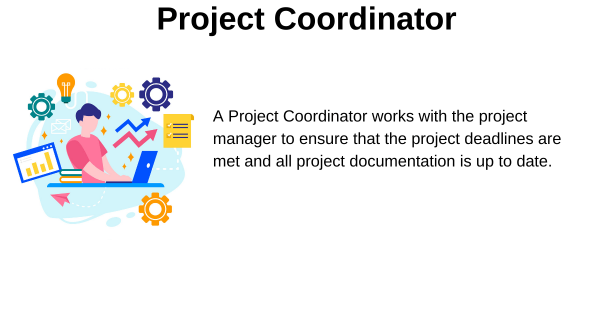
As a Coordinator, you will be responsible for planning, executing, and monitoring project activities to ensure that project objectives are met.
By taking on this role, you will ensure that the project:
- Meets the required quality standards
- Within the budget
- Completed on time
If you are planning to become a project coordinator, you will be responsible for:
- Planning
- Executing
- Monitoring & controlling project activities to ensure that project objectives are met.
To do this, the Project Coordinator must liaise with project stakeholders, track project progress, remove key roadblocks for your team and provide regular updates to the project team.
But what about the challenges? Coordinators may be bogged down by administrative tasks, such as preparing reports and managing project documents. They may also find it difficult to delegate tasks and give clear instructions to project team members.
Additionally, coordinators may have difficulty communicating with upper management and other stakeholders, as they may not have a deep understanding of the project itself, so they may feel like they are always playing catch-up, as they are often reliant on others to provide them with accurate and up-to-date information.
Essential Skills of Project Coordinator
If you have these skills and are looking for a challenging and rewarding career, then a career in project management may be right for you.
Organizational Skills
Organizational skills are critical for project management. First and foremost, a project coordinator must be highly organized and have strong attention to detail. They must be able to juggle multiple tasks at once and keep track of all the moving parts of a project.
This is because you will be responsible for coordinating the activities of a team of people and ensuring that the project is well-timed and within budget.
Negotiation Skills
One of this profession’s key responsibilities is negotiating with stakeholders to ensure that the project meets its needs and expectations. This can be a challenging task, as you need to identify the interests of each stakeholder and find a way to meet them all. Prepare in advance, understand the interests of all parties, and stay calm and level-headed during negotiations.
Communication Skills
Also, a good communicator is a must and is capable of effectively communicating with all project team members. This includes being able to work well under pressure, being able to solve problems quickly, and having a high level of emotional intelligence.
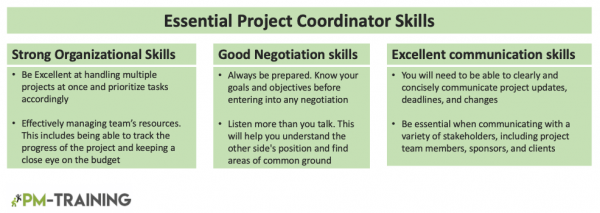
Agile Project Coordinators
You will have a key scrum role in an Agile software environment during the software development process. Your job is to manage the project schedule and ensure that all team members are on track to meet their deliverables.
It is important to be certified in Scrum or have an Agile Certified Practitioner (PMI-ACP) certification. There are a few reasons for this.
- A Scrum certification demonstrates to potential employers that you have a good understanding of the Scrum framework and how it can be used to manage projects. It also shows that you are willing to invest in your own professional development.
- A PMI-ACP certification shows that you have the skills and knowledge to effectively manage projects. It is also a well-recognized certification that will make you more attractive to potential employers.
So if you are looking to boost your career as a Project Coordinator, be sure to get them.
Project coordinators typically have a bachelor’s degree in project management, business, or a related field. After obtaining a position as a project coordinator, many coordinators advance their careers by obtaining a Master’s degree or certification in project management.
Career Path for Project Coordinators
They typically advance in their careers by taking on larger and more complex projects so they can also move into higher-level management positions, such as project managers or program managers.
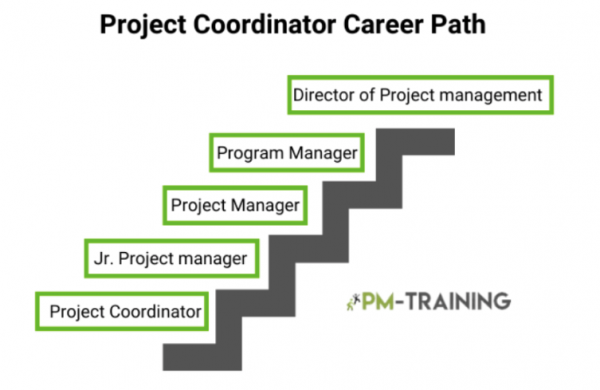
Project Coordinator vs Project Manager Salaries
A project coordinator assists the project manager with day-to-day tasks and ensures that the project stays on track. A project manager, on the other hand, is responsible for the project’s overall success.
The terms “project coordinator” and “project manager” are often used interchangeably, but there is a subtle difference between the two roles.
A company’s organizational structure will typically dictate who has authority and what role each person plays.
- The coordinator and project manager may be the same in a small company.
- A larger company typically has a distinct hierarchy with clear roles and responsibilities.
- The organizational structure will also decide if the role is full-time or part-time.
In some cases, the coordinator may be a full-time position, while in others, they may only be needed on a part-time basis. The size of the company and the scope of the project will also play a role in determining the coordinator’s role.
So if you’re wondering whether you should be a project coordinator or a project manager, the answer depends on your specific skills and experience.
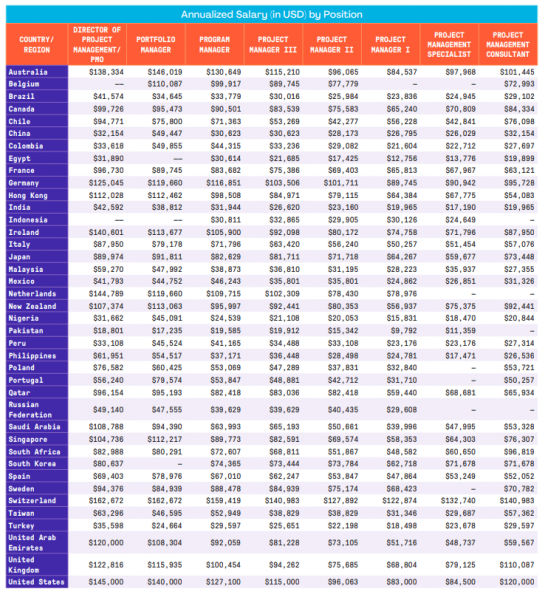
If you have experience managing projects, then you may be better suited for the role of project manager. But if you’re new to the world of project management, then you may want to start out as a project coordinator.
Project Coordinator vs Project expeditor
The Project Coordinator is responsible for ensuring that the project is completed on time and within budget. They work closely with the project manager to develop a project plan and schedule, and they coordinate the project team’s efforts.
On the other hand, the Project Expeditor is responsible for ensuring that the project materials are delivered on time. They work closely with the project coordinator to develop a delivery schedule and coordinate the project suppliers’ efforts.
The key difference between the two is the authority to make decisions. The project expeditor has no authority to make decisions. However, the coordinator has limited authority to make decisions.
Project Coordinator Salary Guide by Country
As with any profession, the expected project coordinator salary will vary depending on experience, education, and location:
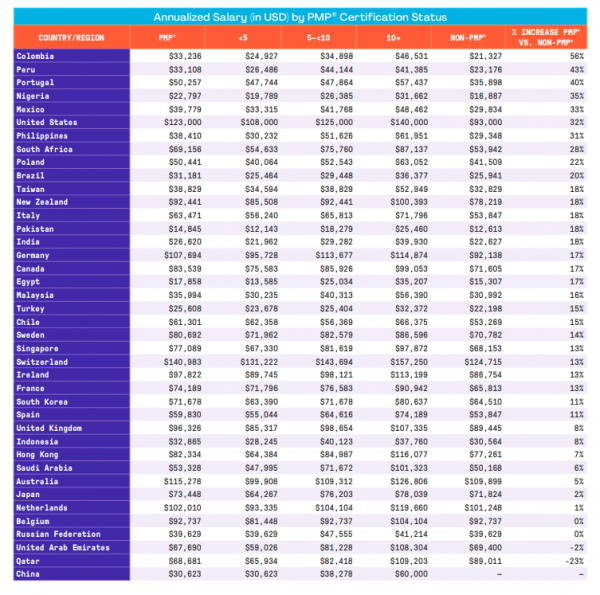
source: pmi_salary_survey_12th_edition_freeversion_final.pdf
Certifications to Become Project Coordinator
The benefits of getting certified include improving your job prospects, increasing your salary, and gaining access to a larger network of professionals.
There are many different types of certifications available for project coordinators. Some of the most popular certifications include:
- Project Management Professional (PMP) certification
- Certified Associate in Project Management (CAPM) certification
According to PMI.org, each of these certifications has different requirements and benefits. For example:
PMP Certification Requirements
- A four-year degree
- 36 months leading projects
- 35 hours of project management education/training or CAPM® Certification
OR
- A high school diploma or an associate’s degree (global equivalent)
- 60 months leading projects
- 35 hours of project management education/training or CAPM® Certification
CAPM Certification Requirements
- Secondary degree
- High school diploma
- Associate’s degree or the global equivalent
- 23 hours of project management education completed by the time you sit for the exam.
PMI-ACP certification Requirements
- Secondary degree
- 21 contact hours of training in agile practices
- 12 months of general project experience within the last 5 years
- 8 months of agile project experience within the last 3 year
If you are interested in pursuing a career in project management, getting certified is a great way to get started.
FAQs
What is a Project Coordinator in a nutshell?
A professional who helps to ensure that a project is completed on time, by working with a project manager and is responsible for tasks such as scheduling, budgeting, and resource allocation
Is it a good career to be a Project Coordinator?
Yes. According to PMI.org, it is estimated that by 2027, employers will need nearly 88 million individuals in project management-oriented roles, with high growth potential.
What are the day-to-day tasks?
If you are planning to become a project coordinator, you will be responsible for planning, executing, and monitoring project activities to ensure that project objectives are met.
What is the difference between a Project Coordinator and a Project Manager?
A project coordinator is responsible for assisting the project manager with day-to-day tasks and ensuring that the project stays on track. A project manager, on the other hand, is responsible for the overall success of the project.
